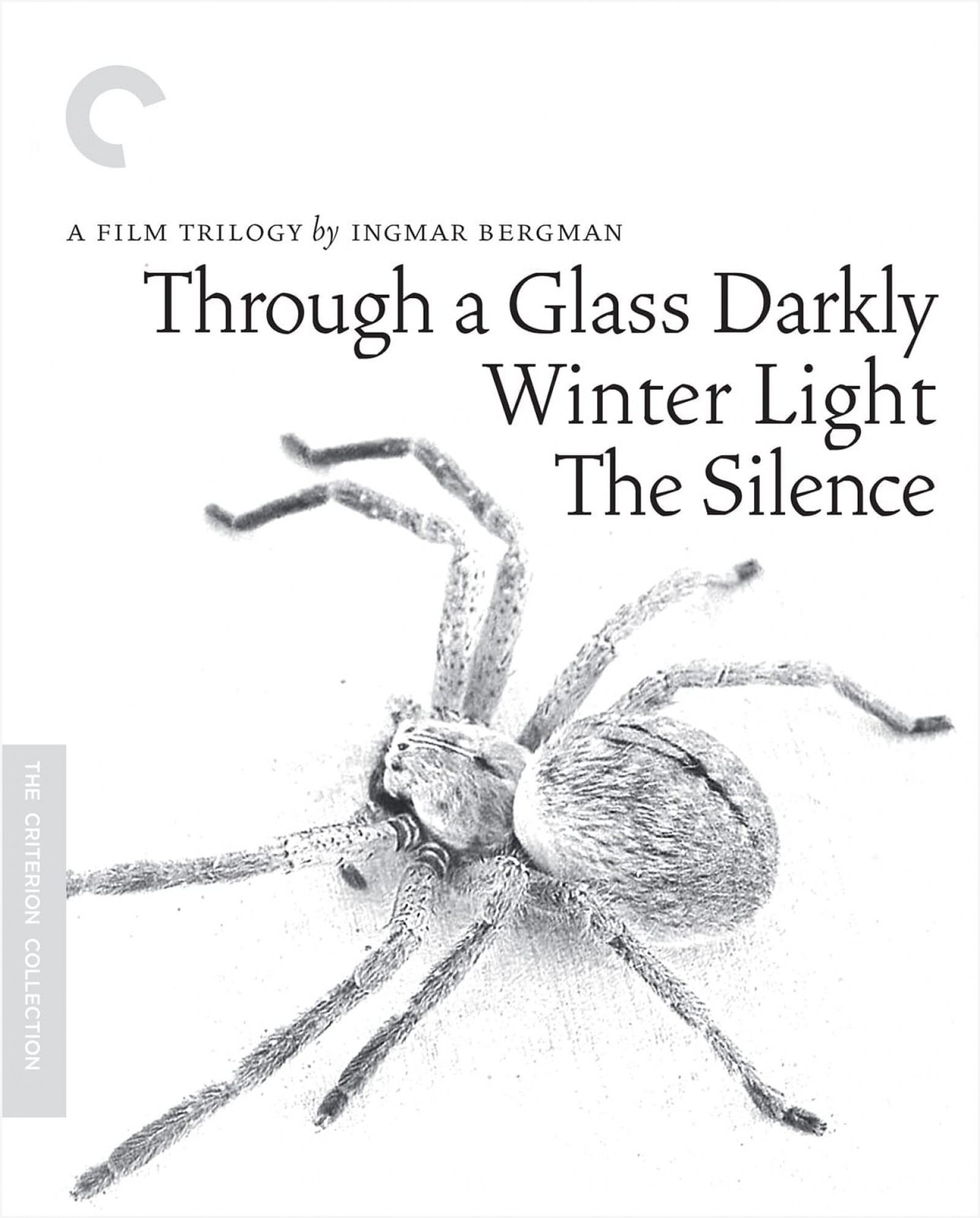136. Ingmar Bergman’s Metaphysical Reduction, Part 1: Through a Glass Darkly
In May 1963, the Swedish film director Ingmar Bergman (1918-2007) retrospectively described his films Through a Glass Darkly, Winter Light, and The Silence as a trilogy with a theme:
“The theme of these three films is a ‘reduction’ – in the metaphysical sense of the word.
THROUGH A GLASS DARKLY – certainty achieved.
WINTER LIGHT – certainty unmasked.
THE SILENCE – God’s silence – the negative impression.
Therefore they constitute a trilogy.”
Metaphysics is the branch of philosophy that addresses questions about the most general and fundamental nature of reality. Thus Bergman’s metaphysical reduction appears to slowly yet radically reduce the real presence of God in the lives of his characters. And this reduction, which mirrors Bergman’s own religious crisis and turn to atheism, offers us profound insights into God, our relation to God, and, especially, love and its negation. It is important to note that Bergman would later claim his interpretation of the films as a trilogy had “neither rhyme nor reason”. Perhaps this is correct. But I will try and demonstrate the worth of his earlier interpretation with quotations and commentary. I will, of course, be very selective given the immense subtlety of these masterpieces. But I think this selectivity will help illuminate some philosophical threads worth pondering. All screenplay quotations, which can differ slightly from the films and their various translations, will be from the book Three Films by Ingmar Bergman, translated by Paul Britten Austin (New York: Grove Press, 1967).
THROUGH A GLASS DARKLY
In Through a Glass Darkly (Academy Award for Best Foreign Language Film 1961) we encounter a young woman, Karin (played by Harriet Andersson), who has recently been released from a hospital after having been diagnosed with schizophrenia. As the film proceeds, it becomes clear she is still having episodes: she hears strange voices coming from behind a wall. Are they from her illness? Could they indeed be from God?
Whatever the case may be, these episodes take quite a toll on her brother Minus (played by Lars Passgård). This is especially the case after Karin is told by these voices to enter into an incestuous relation with him inside a wrecked boat. And at the end of the film Karin sees God emerge from behind a door as a spider with “a loathsome, evil face” who tries to “force himself” into her and, after failing, climbs onto her breast before disappearing up the wall! These experiences burst Minus’ reality into pieces leaving him in a random world where anything can happen at anytime. Consider a few passages in which he expresses how he feels to his father David (played by Gunnar Björnstrand) who, up to this point, has been using his writing and drinking to avoid intimacy with his children:
Minus: Daddy, I’m scared. As I was sitting in the wreck down there, holding Karin, reality burst in pieces for me. D’you understand what I mean?
David: I understand.
Minus: Reality burst and I fell out. It’s like a dream, though real. Anything can happen – anything Daddy!
David takes Minus’ hand as they walk along the beach. He then puts his hands on Minus’ shoulders. Minus continues:
Minus: I can’t live with this new thing, Daddy.
David: Yes, you can. But you must have something to hold on to.
Minus then asks: what can he hold onto? God? If so, he demands some proof. For a moment his father is silent, and Minus takes this silence as evidence that his father has no proof to provide. But then his father, who has been very withdrawn and detached throughout the film, unexpectedly responds: “Yes, I can. But you must listen carefully to what I’m saying Minus”. Let’s continue:
David: It’s written: God is love.
Minus: For me that’s just words and nonsense.
David: I only want to give you an indication of where my own hopes lie.
Minus: And that’s in God’s love?
David: In the knowledge that love exists as something real in the world of men.
Minus assumes this love is a special kind of love. But his father disagrees: all love, from the most ridiculous to the most sublime, is to be included. Indeed, all longing for love and even every denial of love is included. Minus asks: So love is the proof? His father’s response is impressive:
David: We can’t know whether love proves God’s existence or whether love is itself God. After all, it doesn’t make very much difference.
Minus: For you God and love are one and the same phenomenon.
David: I let my emptiness, my dirty hopelessness, rest in that thought, yes.
Minus: Tell me, Daddy.
David: Suddenly the emptiness turns into wealth, and hopelessness into life. It’s like a pardon, Minus. From sentence of death.
Here we recall an earlier scene in which David tells his friend Martin of his failed suicide attempt which helped him see that love emerges even from emptiness: “Out of my emptiness something was born which I dare touch or give name to. A love. For Karin and Minus, And you.” Let’s continue:
Minus: Your words are terribly unreal, Daddy, but I see you mean what you say. And it makes me tremble all over. Daddy?
David: Yes.
Minus: Can it help her?
David: I think so.
Minus: Daddy?
David: Yes.
Minus: I’m shivering, my teeth are chattering, and I’m shaking all over. D’you mind if I take a run?
David: Take a run. I’ll go and get dinner ready. See you in an hour.
After running a bit, Minus pauses and then says something quite beautiful given the past alienation from his father:
“Daddy spoke to me!”
With this touching statement the movie comes to close, having portrayed love as a real force which can emerge even when one has absolutely nothing to live for: it emerges suddenly and mysteriously out of emptiness. God, as we are told in the Book of Genesis, created out of nothingness. Here, too, the love that comes from God – or the love among humans which is God – creates the means to overcome various forms of human alienation. Thus we see why Bergman wrote that the film shows “certainty achieved”: David seems certain of the love of which he speaks and Minus, having now experienced love from his father, seems awakened to its miraculous healing power as well. Perhaps it can even help Karin who at the end of the film returns to the hospital for treatment. It appears that God, far from being the elusive and dangerous spider envisioned by a schizophrenic, is a real presence that brings hope to their lives.
Bergman would later say that Through a Glass Darkly “is a very weary film, much too sentimental, far too romantic” (quoted in The Ingmar Bergman Archives, Taschen Publishing, p. 272). But this sentimentality can be seen as part of the film’s strength insofar as it awakens some nagging doubts. Why is there family alienation, suicide, incest, mental illness, and a real or imagined encounter with an evil spider god at all? And what are we to make of David’s claim that all forms of love, even love’s denial, are evidence of God? This certainly goes far beyond the “God is love and love is God” slogan. Moreover, how could a man who believes God is love act so immorally towards his children throughout the film? All these doubts, when placed in the context of the trilogy, become far more interesting and gain new meaning in relation to what is to come. In the next post we will see how Bergman develops these doubts and how love, both human and divine, is “unmasked” as something far more problematic in the second stage of the metaphysical reduction: Winter Light (go here).







How should we take Bergman’s use of the word “reduction”? If we take his use of reduction as “to return to what came before” rather than as “a lessening” of his belief, maybe he was attempting to reveal the beginnings, or essence, of god.
Over time Bergman changed what he said about the trilogy, even going so far as to deny that he knew what he was doing! I don’t think that his many statements about the films are reliable, and maybe he even intended to obscure or expand their meaning. We’re on our own as far as interpretation goes.
Perhaps the most powerful thing about Through a Glass Darkly are the many gods revealed in it. When David’s suicide fails he doesn’t explicitly say that god intervened- but you know that this is what he believes. It changed his life.
Karin has had no such real event that we know of to take as evidence for the existence of god. Her experience is direct, awesome, joyful, and terrifying. This is a god so old that it predates consciousness.
To Minus, god is revealed through his sister. He follows her into a Jungian cave where secrets are revealed. It’s probably not a coincidence that brother/sister lovers occur in northern mythologies.
So take your pick- there’s plenty of god in the movie. You can choose to remain skeptical, of course, but there are things Martin’s science cannot explain… such as how this movie continues to resonate with us!
Thanks for your perceptive comments! I agree the meaning of reduction is ambiguous. I have tried to follow an interpretation I think makes sense. But it is interesting to think about its meaning in the way you suggest. I especially like your insight that we can find various gods in it. Bergman’s commitment to showing and championing real meaningful human contact, real intimacy, can offer a nice ground for these gods: the gods would be the many ways, despite all the demons of alienation, we make contact. In my post on The Silence, I point out some ways the film portrays modes of fragile contact even amongst extreme alienation.